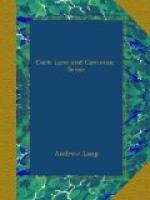However, Professor Huxley lost nothing by not joining the committee of the Dialectical Society. Mr. G. H. Lewes, for his part, hoped that with Mr. Alfred Russel Wallace to aid (for he joined the committee) and with Mr. Crookes (who apparently did not) ’we have a right to expect some definite result’. Any expectation of that kind was doomed to disappointment. In Mr. Lewes’s own experience, which was large, ’the means have always been proved to be either deliberate imposture . . . or the well-known effects of expectant attention’. That is, when Lord Adare, the Master of Lindsay, and a cloud of other witnesses, thought they saw heavy bodies moving about of their own free will, either somebody cheated, or the spectators beheld what they did behold, because they expected to do so, even when, like M. Alphonse Karr, and Mr. Hamilton Aide, they expected nothing of the kind. This would be Mr. Lewes’s natural explanation of the circumstances, suggested by his own large experience.
The results of the Dialectical Society’s inquiry were somewhat comic. The committee reported that marvels were alleged, by the experimental subcommittees, to have occurred. Sub-committee No. 1 averred that ’motion may be produced in solid bodies without material contact, by some hitherto unrecognised force’. Sub-committees 2 and 3 had many communications with mysterious intelligences to vouch for, and much erratic behaviour on the part of tables to record. No. 4 had nothing to report at all, and No. 5 which sat four times with Home had mere trifles of raps. Home was ill, and the seances were given up.




